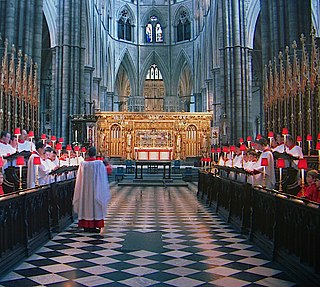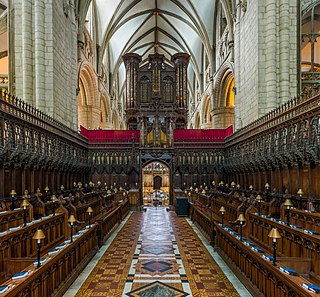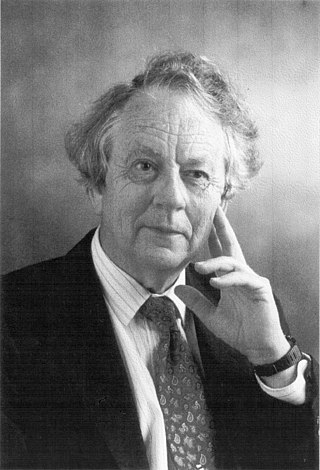
The Magnificat is a canticle, also known as the Song of Mary, the Canticle of Mary and, in the Byzantine tradition, the Ode of the Theotokos. It is traditionally incorporated into the liturgical services of the Catholic Church, the Eastern Orthodox Church, Lutheran Churches and the Anglican Communion. Its name comes from the incipit of the Latin version of the text.

Herbert Norman Howells was an English composer, organist, and teacher, most famous for his large output of Anglican church music.
Priory Records is a record company in the UK founded in 1980, and devoted mostly to church music and organ music. Important projects have included the complete Psalms sung by cathedral choirs to Anglican chant, all of the Magnificat and Nunc dimittis settings by Herbert Howells, the "British Church Composer Series", the "Choral and Music from English Cathedrals", the "Music for Evensong" and, more recently, all the hymns in the complete New English Hymnal Series. There are also three discs of the Communion Service settings of Stanford and four further discs featuring settings of the Te Deum and Jubilate.

The Nunc dimittis, also known as the Song of Simeon or the Canticle of Simeon, is a canticle taken from the second chapter of the Gospel of Luke, verses 29 through 32. Its Latin name comes from its incipit, the opening words, of the Vulgate translation of the passage, meaning "Now you let depart". Since the 4th century it has been used in Christian services of evening worship such as Compline, Vespers, and Evensong.
In Anglican church music, a service is a musical setting of certain parts of the liturgy, generally for choir with or without organ accompaniment.
Herbert Whitton Sumsion was an English musician who was organist of Gloucester Cathedral from 1928 to 1967. Through his leadership role with the Three Choirs Festival, Sumsion maintained close associations with major figures in England's 20th-century musical renaissance, including Edward Elgar, Herbert Howells, Gerald Finzi, and Ralph Vaughan Williams. Although Sumsion is known primarily as a cathedral musician, his professional career spanned more than 60 years and encompassed composing, conducting, performing, accompanying, and teaching. His compositions include works for choir and organ, as well as lesser-known chamber and orchestral works.

Harold Edwin Darke was an English composer and organist. He is particularly known for his choral compositions, which are an established part of the respertoire of Anglican church music. Darke had a fifty-year association with the church of St Michael, Cornhill, in the City of London.

Sir Alfred Herbert Brewer was an English composer and organist. As organist of Gloucester Cathedral from 1896 until his death, he contributed a good deal to the Three Choirs Festival for 30 years.

Hugh Blair was an English musician, composer and organist.

Richard Hey Lloyd was a British organist and composer.

Evensong is a church service traditionally held near sunset focused on singing psalms and other biblical canticles. It is loosely based on the canonical hours of vespers and compline. Old English speakers translated the Latin word vesperas as æfensang, which became 'evensong' in modern English. Typically used in reference to the Anglican daily office's evening liturgy, it can also refer to the pre-Reformation form of vespers or services of evening prayer from other denominations, particularly within the Anglican Use of the Catholic Church.

Arvo Pärt's Nunc dimittis is a setting of the Latin canticle Nunc dimittis for mixed choir a cappella, written in 2001. It was published by Universal Edition.

The Magnificat and Nunc dimittis for Gloucester Cathedral, also known as the Gloucester Service, is a setting by the English composer Herbert Howells of the Magnificat and Nunc dimittis for the Anglican service of Evensong. Scored for four-part choir and organ, it was written in 1946 for Gloucester Cathedral. It was published by Novello in 1947.

In Exile is a motet by Herbert Sumsion, who was for decades organist at Gloucester Cathedral. He set in 1981 a biblical text from Psalm 137 in English, beginning "By the waters of Babylon", scored for double choir a cappella. The motet was published by Basil Ramsey.

The Service in B-flat major, Op. 10, is a collection of Anglican church music by Charles Villiers Stanford for mixed choir and organ containing the canticles for each of the principal services of the Anglican Church. Stanford set the traditional liturgical texts in English in 1879 when he was the organist of Trinity College, Cambridge. They were published by Novello in 1902. Stanford orchestrated the work in 1903, with additional organ.

Magnificat and Nunc dimittis in D is a choral setting by the Irish composer Charles Wood of the Magnificat and Nunc dimittis for the Anglican service of Evening Prayer. Scored for four-part choir and organ, it was written in 1898. It is also known as Evening Service in D major.
Nunc dimittis is a canticle from the New Testament. The canticle was often translated and set to music. Nunc dimittis and related translations may also refer to:

Collegium Regale is a collection of choral settings by the English composer Herbert Howells of the canticles for the Anglican services of Mattins, Holy Communion and Evening Prayer. Scored for four-part choir, solo tenor and organ, the pieces were written between 1944 and 1956 "for the King's College, Cambridge". The first of the pieces were first published by Novello in 1947, and they have become a popular piece of music in the Anglican church music repertoire.

Gerald Mills Hendrie,, is an English scholar, composer, organist, pianist and harpsichordist.














